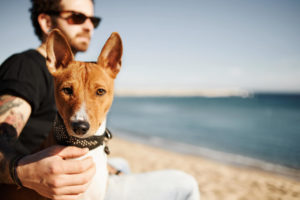

Some dogs are water babies while others prefer to relax on the sand and watch the rolling waves.
It’s also a good chance for our furry friends to socialise with other dogs and people. Luckily, specific areas of Cronulla beach are dog-friendly before 10 am and after 4 pm. Click here to find out which areas are dog-friendly visit. However, to keep them safe while at the beach, it’s important to be aware of and avoid specific dangers that are present at the beach such as sunburn, heat stroke, hot sand, jellyfish, eating sand and foreign objects, and the ocean itself.
Sunburn
Just like us, dogs can get sunburnt too. Dogs with pale skin with short fur tend to be at greater risk, and areas with thinner fur such as the nose, ears and belly are more susceptible, and if you have a white dog, it’s a good idea to keep them in the shade. As human sunscreen can be toxic to dogs especially as they tend to lick it off, it’s best to avoid using them at all. Fortunately, there is dog-friendly sunscreen available that can protect your best friend from the harmful UV rays. Contact your friendly team at Cronulla Vet Clinic for more information on doggy sunscreen.
Heat stroke
Dogs aren’t able to tolerate heat as well as we do. They don’t sweat on their skin, only on the pads on their feet and their main way of keeping cool is by panting. The mixture of running around, high humidity and temperatures can become too much and lead to overheating and heat stroke. Signs of heatstroke begin with excessive panting and difficulty breathing. They may become lethargic and stagger when they walk. If not treated quickly, it can make your dog sick and become quite dangerous. If you see your dog overexerting themselves, let them rest in a cool shady area for a while and make sure they are getting lots of water to stay hydrated. It’s also a good idea to bring some frozen water and allow your dog to have little drinks throughout the day. Avoid extreme temperatures and wait for a cooler part of the day to go to the beach.
Hot Sand
The pads of dogs feet are quite sensitive and can easily get burnt if the sand is too hot. If the sand is too hot for you to walk on, it’s probably also too hot for your pup. You can carry your pooch to the wet and cooler sand, or wait for a cooler day to go to the beach.
Jellyfish
Australian beaches are known for having blue bottles which can cause a painful sting when touched. In our pooches, they can cause a similar effect and can make them sick if ingested. Look out for any vomiting and take them to the vet for further care and treatment. Be careful not to pull it from their mouths as it can cause a painful sting to yourself too.
Eating Sand
Dogs can either accidentally or deliberately eat sand at the beach. Sometimes, they can ingest sand if they’re playing fetch with a sandy tennis ball or when they’re digging in the sand, and it gets in their mouth. Sand is quite irritating to the stomach and causes an upset. If large amounts are ingested, it can lead to sand impaction and interrupt the normal passage of contents in the intestines. This is an emergency and treatment needs to be sought as soon as possible. Signs of sand impaction can be quite non-specific but can include vomiting, unwillingness to eat, and abdominal pain.
Sand can also cause other problems, for example, it can get into dog’s eyes and create eye lesions and eye irritations. If eye irritation is seen, irrigate your dog’s eye carefully and contact a vet asap if the problem persists.
Foreign objects
For dogs who love to explore the world through their mouths, the beach is a wonderland! However, there are many things that if they eat can make then very unwell. It can make them choke or cause a blockage requiring immediate intervention. These include rubbish, dead fish or birds, stones, and hooks just to name a few. Keep a watchful eye on your pooch and make sure they don’t get into anything they shouldn’t.
Big waves
Even dogs that are strong swimmers can get bowled over by strong waves, and it can get quite dangerous for them. It’s best not to let them venture too far out and always keep them in view. There are dog life jackets available or blow up floaties that can assist weaker swimmers and help them if they get a bit tired.
All the team at Cronulla Veterinary Clinic wish everyone a Happy and Safe Easter!!
